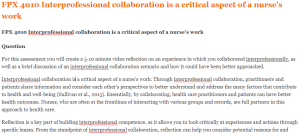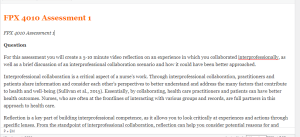FPX 4010 Interprofessional collaboration is a critical aspect of a nurse’s work
Sample Answer for FPX 4010 Interprofessional collaboration is a critical aspect of a nurse’s work Included After Question
Question
For this assessment you will create a 5-10 minute video reflection on an experience in which you collaborated interprofessionally, as well as a brief discussion of an interprofessional collaboration scenario and how it could have been better approached.
A Sample Answer For the Assignment: FPX 4010 Interprofessional collaboration is a critical aspect of a nurse’s work
Title: FPX 4010 Interprofessional collaboration is a critical aspect of a nurse’s work
Interprofessional collaboration is a critical aspect of a nurse’s work. Through interprofessional collaboration, practitioners and patients share information and consider each other’s perspectives to better understand and address the many factors that contribute to health and well-being (Sullivan et al., 2015). Essentially, by collaborating, health care practitioners and patients can have better health outcomes. Nurses, who are often at the frontlines of interacting with various groups and records, are full partners in this approach to health care.
Reflection is a key part of building interprofessional competence, as it allows you to look critically at experiences and actions through specific lenses. From the standpoint of interprofessional collaboration, reflection can help you consider potential reasons for and causes of people’s actions and behaviors (Saunders et al., 2016). It also can provide opportunities to examine the roles team members adopted in a given situation as well as how the team could have worked more effectively.

FPX 4010 Interprofessional collaboration is a critical aspect of a nurse’s work References
Saunders, R., Singer, R., Dugmore, H., Seaman, K., & Lake, F. (2016). Nursing students’ reflections on an interprofessional placement in ambulatory care. Reflective Practice, 17(4), 393–402.
Sullivan, M., Kiovsky, R., Mason, D., Hill, C., & Duke, C. (2015). Interprofessional collaboration and education. American Journal of Nursing, 115(3), 47–54.
Demonstration of Proficiency
Competency 1: Explain strategies for managing human and financial resources to promote organizational health.
Identify how poor collaboration can result in inefficient management of human and financial resources supported by evidence from the literature.
Competency 2: Explain how interdisciplinary collaboration can be used to achieve desired patient and systems outcomes.
Reflect on an interdisciplinary collaboration experience noting ways in which it was successful and unsuccessful in achieving desired outcomes.
Identify best-practice interdisciplinary collaboration strategies to help a team to achieve its goals and work more effectively together.
Competency 4: Explain how change management theories and leadership strategies can enable interdisciplinary teams to achieve specific organizational goals.
Identify best-practice leadership strategies from the literature, which would improve an interdisciplinary team’s ability to achieve its goals.
Competency 5: Apply professional, scholarly, evidence-based communication strategies to impact patient, interdisciplinary team, and systems outcomes.
Communicate in a professional manner that is easily audible and uses proper grammar. Format reference list in current APA style.
Professional Context
This assessment will help you to become a reflective practitioner. By considering your own successes and shortcomings in interprofessional collaboration, you will increase awareness of your problem-solving abilities. You will create a video of your reflections, including a discussion of best practices of interprofessional collaboration and leadership strategies, cited in the literature.
Click here to ORDER an A++ paper from our MASTERS and DOCTORATE WRITERS: FPX 4010 Interprofessional collaboration is a critical aspect of a nurse’s work
Scenario
As part of an initiative to build effective collaboration at your Vila Health site, where you are a nurse, you have been asked to reflect on a project or experience in which you collaborated interprofessionally and examine what happened during the collaboration, identifying positive aspects and areas for improvement.
You have also been asked to review a series of events that took place at another Vila Health location and research interprofessional collaboration best practices and use the lessons learned from your experiences to make recommendations for improving interprofessional collaboration among their team. Your task is to create a 5–10 minute video reflection with suggestions for the Vila Health team that can be shared with leadership as well as Vila Health colleagues at your site. Note: If you require the use of assistive technology or alternative communication methods to participate in this activity, please contact [email protected] to request accommodations. If, for some reason, you are unable to record a video, please contact your faculty member as soon as possible to explore options for completing the assessment.
Instructions
Using Kaltura, record a 5–10 minute video reflection on an interprofessional collaboration experience from your personal practice, proposing suggestions on how to improve the collaboration presented in the Vila Health: Collaboration for Change activity.
Be sure that your assessment addresses the following criteria. Please study the scoring guide carefully so you will know what is needed for a distinguished score:
Reflect on an interdisciplinary collaboration experience, noting ways in which it was successful and unsuccessful in achieving desired outcomes.
Identify how poor collaboration can result in inefficient management of human and financial resources, citing supporting evidence from the literature.
Identify best-practice leadership strategies from the literature that would improve an interdisciplinary team’s ability to achieve its goals, citing at least one author from the literature.
Identify best-practice interdisciplinary collaboration strategies to help a team achieve its goals and work together, citing the work of at least one author.
Communicate in a professional manner, is easily audible, and uses proper grammar. Format reference list in current APA style.
You will need to relate an experience that you have had collaborating on a project. This could be at your current or former place of practice, or another relevant project that will enable you to address the requirements. In addition to describing your experience, you should explain aspects of the collaboration that helped the team make progress toward relevant goals or outcomes, as well as aspects of the collaboration that could have been improved.
A simplified gap-analysis approach may be useful:
What happened?
What went well?
What did not go well?
What should have happened?
After your personal reflection, examine the scenario in the Vila Health activity and discuss the ways in which the interdisciplinary team did not collaborate effectively and the negative implications for the human and financial resources of the interdisciplinary team and the organization as a whole.
Building on this investigation, identify at least one leadership best practice or strategy that you believe would improve the team’s ability to achieve their goals. Be sure to identify the strategy and its source or author and provide a brief rationale for your choice of strategy.
Additionally, identify at least one interdisciplinary collaboration best practice or strategy to help the team achieve its goals and work more effectively together. Again, identify the strategy, its source, and reasons why you think it will be effective.
You are encouraged to integrate lessons learned from your self-reflection to support and enrich your discussion of the Vila Health activity.
You are required to submit an APA-formatted reference list for any sources that you cited specifically in your video or used to inform your presentation. The Example Kaltura Reflection will show you how to cite scholarly sources in the context of an oral presentation.
Refer to the Campus tutorial Using Kaltura [PDF] as needed to record and upload your reflection.
Additional Requirements
FPX 4010 Interprofessional collaboration is a critical aspect of a nurse’s work References:
Cite at least 3 professional or scholarly sources of evidence to support the assertions you make in your video. Include additional properly cited references as necessary to support your statements.
APA Reference Page:Submit a correctly formatted APA reference page that shows all the sources you used to create and deliver your video.
You may wish to refer to the Campus APA Module for more information on applying APA style.
FPX 4010 Interprofessional collaboration is a critical aspect of a nurse’s work Grading Rubric
| Performance Category | 100% or highest level of performance
100% 16 points |
Very good or high level of performance
88% 14 points |
Acceptable level of performance
81% 13 points |
Inadequate demonstration of expectations
68% 11 points |
Deficient level of performance
56% 9 points
|
Failing level
of performance 55% or less 0 points |
| Total Points Possible= 50 | 16 Points | 14 Points | 13 Points | 11 Points | 9 Points | 0 Points |
| Scholarliness
Demonstrates achievement of scholarly inquiry for professional and academic topics. |
Presentation of information was exceptional and included all of the following elements:
|
Presentation of information was good, but was superficial in places and included all of the following elements:
|
Presentation of information was minimally demonstrated in all of the following elements:
|
Presentation of information is unsatisfactory in one of the following elements:
|
Presentation of information is unsatisfactory in two of the following elements:
|
Presentation of information is unsatisfactory in three or more of the following elements
|
| 16 Points | 14 Points | 13 Points | 11 Points | 9 Points | 0 Points | |
| Application of Course Knowledge
Demonstrate the ability to analyze and apply principles, knowledge and information learned in the outside readings and relate them to real-life professional situations |
Presentation of information was exceptional and included all of the following elements:
|
Presentation of information was good, but was superficial in places and included all of the following elements:
|
Presentation of information was minimally demonstrated in the all of the following elements:
|
Presentation of information is unsatisfactory in one of the following elements:
|
Presentation of information is unsatisfactory in two of the following elements:
|
Presentation of information is unsatisfactory in three of the following elements
|
| 10 Points | 9 Points | 6 Points | 0 Points | |||
| Interactive Dialogue
Initial post should be a minimum of 300 words (references do not count toward word count) The peer and instructor responses must be a minimum of 150 words each (references do not count toward word count) Responses are substantive and relate to the topic. |
Demonstrated all of the following:
|
Demonstrated 3 of the following:
|
Demonstrated 2 of the following:
|
Demonstrated 1 or less of the following:
|
||
| 8 Points | 7 Points | 6 Points | 5 Points | 4 Points | 0 Points | |
| Grammar, Syntax, APA
Points deducted for improper grammar, syntax and APA style of writing. The source of information is the APA Manual 6th Edition Error is defined to be a unique APA error. Same type of error is only counted as one error. |
The following was present:
AND
AND
|
The following was present:
AND/OR
AND/OR
|
The following was present:
AND/OR
AND/OR
|
The following was present:
AND/OR
AND/OR
|
The following was present:
AND/OR
AND/OR
AND/OR
|
The following was present:
AND/OR
AND/OR
|
| 0 Points Deducted | 5 Points Lost | |||||
| Participation
Requirements |
Demonstrated the following:
|
Failed to demonstrate the following:
|
||||
| 0 Points Lost | 5 Points Lost | |||||
| Due Date Requirements | Demonstrated all of the following:
A minimum of one peer and one instructor responses are to be posted within the course no later than Sunday, 11:59 pm MT. |
Demonstrates one or less of the following.
A minimum of one peer and one instructor responses are to be posted within the course no later than Sunday, 11:59 pm MT. |

